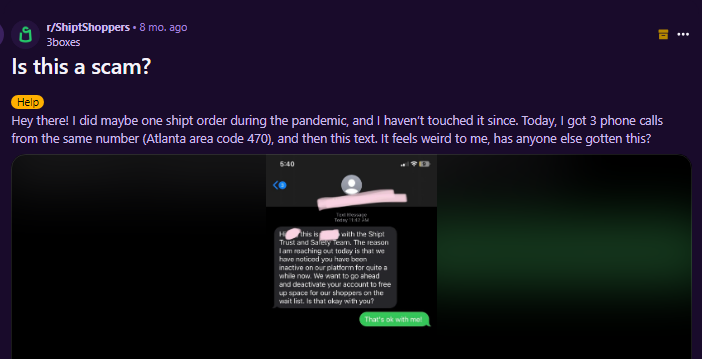Table of Content
- Is Area Code 470 a Scam?
- What Kinds of Scams are Associated with the Area Code 470?
- 4 Easy Indicators to Know if a Call Coming from Area Code 470 is Scam
- How Do Scammers from Area Code 470 Leverage Neighbour Spoofing?
- What are the Other Most Common Codes Involved in Scams Having Area Codes?
- How Can You Avoid Area Code 470 Scams?
- Frequently Asked Questions (FAQs)
- Watch Out for 470 Area Code Calls!
Have you ever had that terrible feeling when you see an unknown number on your phone, especially one with a strange area code?
You may be right to be cautious. Scammers have been known to use area code 470, which is commonly associated with Atlanta, Georgia, to target unsuspecting victims. But don't panic!
The following article will teach you how to get around these con artists and avoid falling victim to their frauds.
What is Area Code 470?
The 470 area code represents the Atlanta Metropolitan Area in the state of Georgia. The area code encompasses areas previously served by area codes 770 and 404, including important cities and hubs like Atlanta City, Roswell, Duluth, Sandy Springs, East Point, Johns Creek, and Alpharetta.
Is Area Code 470 a Scam?
The area code 470 itself is not a scam. It is a legitimate area code for the Atlanta, Georgia area. However, scammers occasionally utilize 470 in their phone numbers to fool people into answering because it appears to be a local call.
You may receive valid calls from this area code, particularly if you live in Georgia or have ties there. Scammers sometimes utilize 470. Be wary of unfamiliar numbers, especially those with familiar area codes.
Text scams originated from nine of the twelve phone numbers, according to BeenVerified. Bank and credit card scams were traced back to four of the "Dirty Dozen" list. There are three delivery frauds.
Two of the 12 hot scammer numbers send the "big winner" text or call. In Georgia, the most common area code for a scam is 470.
Discover if Your Most Critical Identifiers Have Been Exposed on the Dark Web
Receive timely alerts and actionable insights with PurePrivacy's Dark Web Monitoring.
What Kinds of Scams are Associated with the Area Code 470?
Scammers frequently use the area code 470, mainly when conducting phishing operations via text messaging. Here are some of the usual scams you could come across with a 470 area code:
Delivery Scam
You receive a text message, purportedly from a delivery company such as Amazon, regarding an item delivery that requires confirmation. The text will most likely contain a link. When you click the link, you will be taken to a bogus website meant to steal your personal information.
In previous years, the FTC warned about a text message scam in which customers receive what appears to be a FedEx tracking report. In variations on the technique, fraudsters falsely use the names of UPS and the United States Postal Service.
According to the text, a "delivery" can be planned by clicking a link. People are then taken to an "Amazon" website, where they are invited to fill out a customer satisfaction survey.
Then they learn they've won a free reward. To cover shipping and handling, they just need to enter a credit card number.
Payment Card Scam
The text message alerts you to an issue with your credit card or bank account. Similar to the delivery scam, it will include a link to a legitimate-looking phishing site designed to steal your bank information.
Fake Prize or Contest Scam
The text message claims you have won a prize or participated in a contest. To claim your "prize," you must give personal information or pay a processing fee.
Technical Assistance Scam
The caller pretends to be from a tech support business, such as Microsoft, and informs you that your machine has a virus. They will then try to persuade you to pay for needless services or remote access to "fix" the issue.


4 Easy Indicators to Know if a Call Coming from Area Code 470 is Scam
The area code 470 is valid for the Atlanta, Georgia area; however, it is also widely utilized by scammers. Here are some ways to recognize a possible scam call from a 470 number:
- Emergency or Threats
The caller creates a sense of urgency or threatens you with penalties if you do not take immediate action.
- Suspicious Offers
The offer appears too good to be true, such as receiving a prize you never entered or easy money with no work.
- Personal Information Requests
The caller requests personal information such as your Social Security number, bank account information, or password.
- Payment Demands
The caller requests rapid payment using unconventional ways such as gift cards, money transfers, or cryptocurrency.
How Do Scammers from Area Code 470 Leverage Neighbour Spoofing?
Area code 470 serves parts of Georgia, the United States. Scammers frequently employ neighbor spoofing to deceive victims into answering their calls.
Scammers use neighbor spoofing to make their caller ID appear to be a local number, which may even be the same as your own. This can make the call appear more trustworthy, making you more likely to answer it.
Here's how scammers with area code 470 might use neighbor spoofing.
- They may impersonate a local phone number to circumvent spam filters. Many telephone companies now restrict calls from recognized scam numbers. Scammers can evade these restrictions by faking a local number and calling you.
- They might attempt to acquire your trust. People are more inclined to respond to a call from a number that appears to be local. Scammers may utilize this to gain your trust and deceive you into disclosing personal information or money.
If you receive a call from an unknown number, even if it looks local, you should always proceed cautiously.
The United States Marshals Service (USMS) Eastern District of Louisiana has warned the public about a type of phone fraud known as "spoofing," in which official phone numbers are used to deceive consumers into paying money to scammers.
Illing said:
“This tactic is known as neighbor spoofing, where scammers use technology to modify what number appears on your caller ID to impersonate phone numbers from friends, local businesses, and in our case, law enforcement, to appear legit,”
He continued,
“Our office is receiving calls from people asking us why the U.S. Marshals are [sic] seeking money from them. We want people to know these calls are scams."
The USMS had been advising customers to report the calls to their local FBI office and register a consumer complaint with the FTC.
What are the Other Most Common Codes Involved in Scams Having Area Codes?
Because 470 is the area code for Atlanta, Georgia's capital, you are more likely to receive spam text messages or phone calls from this number if you live in the state.
Residents of Georgia most frequently report the following spam area codes:
- 770
- 706
- 404
- 678
- 470
- 229
- 478
- 912
- 762, and
- 855 (Toll-fee).
How Can You Avoid Area Code 470 Scams?
You cannot completely avoid fraud that arises from area code 470 (or any other area code for that matter), but there are things you can take to considerably lower your risk.
Don't Answer Unknown Calls
If you don't recognize the number, let it go to voicemail. Scammers frequently rely on victims answering the phone to complete their schemes.
Do Not Trust Caller ID
Scammers can spoof phone numbers to appear to be calling from a local number or a reputable company.
Beware Of Unwanted Calls And Texts
Never share personal information or click on links in texts or emails from unknown senders, especially if they reference a well-known company.
The FBI has issued a public service announcement warning the public about a troublesome level of fraudulent SMS texting attempting to scam toll road users. Toll road customers could be deceived into giving away sensitive data, including credit card information.
— E470 (@E470) April 22, 2024
PLEASE BE… pic.twitter.com/do9MdF8n9Q
Verify Information Directly
If you receive a call or text that appears to be real, do not call the number provided. Look for the firm or organization's phone number and contact them directly.
Report Fraud Calls
You can report scam calls to the Federal Trade Commission (FTC), which helps them track scam trends and identify scammers.
Consider Call-Blocking Applications
There are apps available to assist you block fraudulent calls and robocalls, but choose trusted applications as they might also monitor your online activities.
PurePrivacy Secures You from Targeted Scams
If scammers get your personal information, they can use it to commit identity theft. PurePrivacy reduces the risk of data leaks by protecting your personal information. It also prevents scammers from tracking you and attacking you with targeted scams by minimizing data harvesters.
Frequently Asked Questions (FAQs)
-
Why do scammers use the area code 470?

Scammers utilize area code 470 to deceive you into believing the call or text is coming from a local location, increasing the likelihood that you would answer or respond.
-
Can I prevent calls from the area code 470?

While technically possible, blocking a full area code may not be the best choice. Legitimate businesses or contacts may utilize the area code. However, you can block certain numbers that you believe are scammers. For instructions, refer to your phone's manual or the carrier's website.
-
Is the 470 area code used in any other areas outside Atlanta?

Yes, but not as often, the 470 area code is used in western North Carolina and a tiny region of Maine. You may receive legitimate calls from the 470 code if you live in any of these places.
Watch Out for 470 Area Code Calls!
While a 470 area code does not always indicate a scam, scammers regularly exploit it. Be wary of unexpected calls or texts, especially ones that need immediate action or include links.
If you suspect a scam, do not respond; report it to the FTC. By remaining watchful, you can avoid becoming a target of these false attempts.






